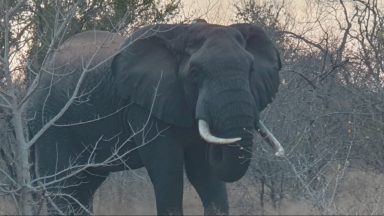A small but fascinating creature has caught the eye of this Peace Parks crew who are out walking in Maputo National Park.
Dung beetles are intriguing insects that are vitally important to ecosystems. There are more than 5000 species of dung beetles, with new ones still being discovered. What unites these different types is that they all love dung, or animal faeces. Because of their hard labour – moving, shifting and breaking down the dung of a multitude of animals – they enable the nutrients held in the dung to return to the ecosystem, aiding its healthy functioning. Think of them as nature’s sewage disposal unit! Through dung movements, seeds are dispersed, livestock parasites are reduced, plant growth is promoted and animal dung magically disappears from the landscape.
Dung beetles fall into three main groups: dwellers, tunnellers and rollers. They all have an acute sense of smell, which they use to find dung. Dweller dung beetles live and breed inside piles of dung. Tunnellers dig tunnels in the soil and drag small pieces of dung inside.
This particular dung beetle is a roller. Using its hind legs, the male beetle shapes the dung into a ball before rolling it away to bury it in the soil. Able to roll dung up to 10 times their weight, the beetle moves in a straight line, confronting all the obstacles in its way. As dung beetles steal dung balls from each other they always appear to be in a hurry, scooting off with their find before another beetle takes it. Once the ball is buried, the female lays an egg inside it and the larvae feed on the dung ball as they grow, safe and sound in the soil.
The dung beetle is yet another example of the importance of all creatures to a healthy, functioning ecosystem. Just as iconic animals such as lion and elephant are necessary to transfrontier conservation areas, so too is every other creature, large and small.
Peace Parks and partners strive to protect and aid the recovery of ecosystems in transfrontier conservation areas. Keep watching Peace Parks TV to follow live action from the ground throughout 2022.

